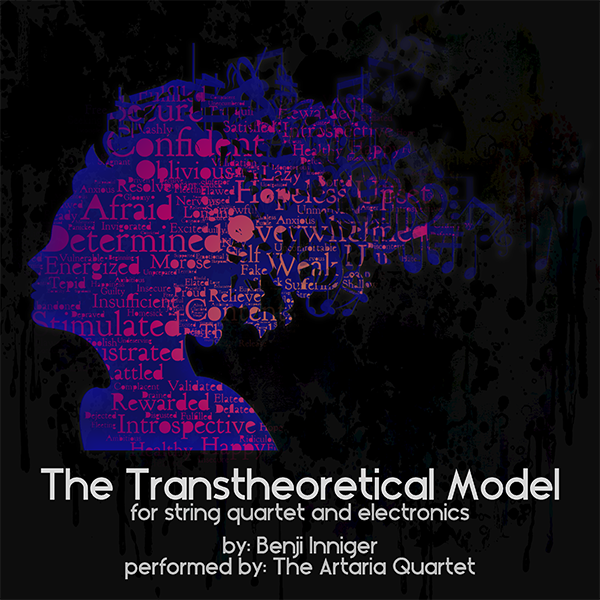The Transtheoretical Model
The Transtheoretical Model is a theory of behavioral psychology that describes the six stages or adapting to change. This is much like the stages of grief, but rather addresses how one adapts to a change in their life. In addition to the scientific connection, the piece as a whole focuses on the struggle between optimistic drive and nagging pessimism, how anxiety introduces noise and barriers to goals and motivation, and the difference between planned and unplanned change.
Each of the six movements attempts to musically describe the six elements of this process of change. the composition is based on 52 responses from a survey sent at the beginning of the project (February 2021) to amass the adjectives you see below, research done on the topic, and my own thoughts and conclusions.
The piece is approximately 26’ in total.
Part 1: Precontemplation
In this stage, people do not intend to take action in the foreseeable future (defined as within the next 6 months). People are often unaware that their behavior is problematic or produces negative consequences. People in this stage often underestimate the pros of changing behavior and place too much emphasis on the cons of changing behavior.
Part 2: Contemplation
In this stage, people are intending to start the healthy behavior in the foreseeable future (defined as within the next 6 months). People recognize that their behavior may be problematic, and a more thoughtful and practical consideration of the pros and cons of changing the behavior takes place, with equal emphasis placed on both. Even with this recognition, people may still feel ambivalent toward changing their behavior.
Part 3: Preparation (Determination)
In this stage, people are ready to take action within the next 30 days. People start to take small steps toward the behavior change, and they believe changing their behavior can lead to a healthier life.
Part 4: Action
In this stage, people have recently changed their behavior (defined as within the last 6 months) and intend to keep moving forward with that behavior change. People may exhibit this by modifying their problem behavior or acquiring new healthy behaviors.
Part 5: Maintenance
In this stage, people have sustained their behavior change for a while (defined as more than 6 months) and intend to maintain the behavior change going forward. People in this stage work to prevent relapse to earlier stages.
Part 6: Termination
In this stage, people have no desire to return to their unhealthy behaviors and are sure they will not relapse. Since this is rarely reached, and people tend to stay in the maintenance stage, this stage is often not considered in health promotion programs.
Credits:
Composer, electronics, recording, production: Benji Inniger
Strings: Artaria Quartet (Ray Shows, Nancy Oliveros, Annalee Wolf, Patricia Ryan)
Special Thanks: Alyssa Inniger, ken freed, emily saathoff, justin knoepfel, sharon mautner-rodgers, bethel balge, hans bloedel, the macphail center for music, church of the holy name, the minnesota state arts board
Benji Inniger is a fiscal year 2021 recipient of a Creative Support for Individuals grant from the Minnesota State Arts Board. This activity is made possible by the voters of Minnesota through a grant from the Minnesota State Arts Board, thanks to a legislative appropriation from the arts and cultural heritage fund.













